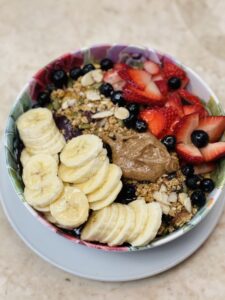Most of us can easily remember a time when eating fats was the number one dieting no-no. In fact, there’s an entire generation of people who grew up believing that staying fit depended on following a fat-free diet. When the first-ever set of U.S. Dietary Guidelines was introduced in the ‘70s, fat was the ultimate villain. Along with eating more fruits and veggies, Americans were told to avoid total fat, saturated fat, cholesterol, and sodium. They were also told that everyone except young children should opt for low-fat and non-fat dairy products, and so began the fat-free craze of the last 40 years.
But you guessed it: much of what we were taught about eating fats wasn’t exactly true. According to a study from JAMA Internal Medicine, the early narratives about fat aimed to take the focus off the cardiovascular damage sugar can do and shift the blame to saturated fat instead. While fats are typically higher-calorie foods, research now shows eating healthy fats can make for a better diet overall.
Here’s the skinny on why you need to stop fearing fats.
We Need Fats to Function
Our bodies need fat to carry out basic processes. Essential nutrients like vitamins A, E, and K are fat-soluble, which means they need to be bound in fat in order for our bodies to use them.
Dietary fat also helps maintain your body temperature, insulates your organs, supports hormone production and cell growth, and gives us energy – which is all pretty important.
Sugar is a Common Replacement for Fat
Fat makes food tender, rich, and just plain delicious. So when manufacturers remove fat from processed foods, they typically replace it with sugar or artificial flavorings to give the product that same satisfying taste. While most full fat foods – like all foods – should be consumed in moderation, it’s usually better to opt for the original version than its “skim” or low-fat alternatives.
Not All Fats Are Created Equal
Not all fats are created equal, and some are better for you than others. The three major types of fat include:
- Unsaturated: Fats that are liquid at room temperature. Commonly found in fish, fruits, vegetables, nuts, and seeds.
- Saturated: Fats that are solid at room temperature. Commonly found in meats, cheeses, whole-fat milk, and coconut oil.
- Trans: Artificial fats that are found in highly processed foods.
Unsaturated fat may lower LDL, or “bad” cholesterol levels, and can reduce a person’s risk for heart disease. Saturated and trans fats can have the opposite effect, increasing your risk of heart disease, stroke, and type 2 diabetes.
In general, trans fats should be avoided, saturated fats should be consumed in moderation, and unsaturated fats have been proven to be healthier for the human body. Try incorporating these fatty superfoods into your diet.
- Avocados: Unlike other fruits, about 77% of the calories in an avocado come from fat. They are also a great source of potassium and fiber.
- Dark chocolate: Not only is dark chocolate loaded with vitamins, minerals, and antioxidants, this tasty treat is also high in healthy fats. Just make sure you choose a chocolate that’s over 70% cocoa.
- Fatty fish: Fishes like salmon, mackerel, sardines, and herring, contain heart-healthy omega-3 fatty acids, high-quality proteins, and other nutrients. If you’re not a fan of fish, taking a fish oil supplement will deliver all the omega-3s you need.
- Nuts and seeds: These salty snacks are high in healthy fats, fiber, and plant-based protein.
- Full-fat yogurt: The probiotics in natural, full-fat yogurt can improve digestive health. Many yogurts found on store shelves are low on fat but high in sugar, so be sure to read the label before you buy.
From supercharged smoothies and juices to organic snacks and salads, our menu has an option to satisfy every craving the healthy way. Join us at The Juice Hive Mon-Sat (8 am-4 pm) and Sun (9 am-2 pm)!



